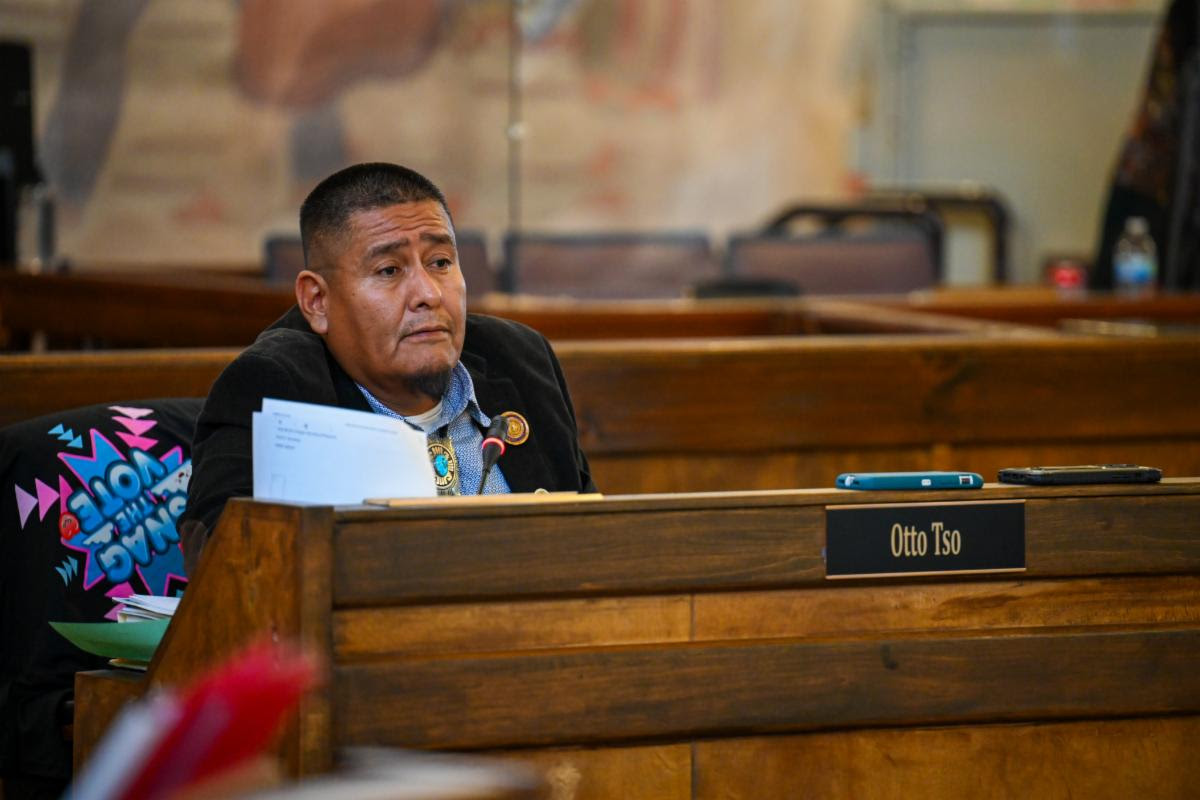
- Details
- By Native News Online Staff
Native Vote 2024. On Thursday, October 24, the 25th Navajo Nation Council approved Legislation 0232-24, which allocates an emergency appropriation of $961,602 from the Unreserved, Undesignated Fund Balance (UUFB) to the Navajo Election Administration (NEA).
This legislation aims to address urgent budget shortfalls to ensure operational readiness for the general election on November 5, 2024, as well as related activities planned for early 2025. The funding will support staffing, updates to voter registration, accessibility improvements, and logistical assistance at polling sites throughout the Navajo Nation.
Council Delegate Otto Tso, who sponsored the legislation, emphasized the importance of this funding for maintaining the integrity of the election process. “This funding is essential to ensure that our elections are accessible, fair, and transparent,” he stated. “Every eligible voter deserves a seamless voting experience, free from barriers.”
The approved funds will be allocated to several critical areas, with a substantial portion dedicated to hiring temporary staff, including poll officials and other essential election personnel. Additional resources will be used for transportation and logistical support to enhance the delivery of election services.
To meet equipment needs, funds have been set aside for essential supplies, such as ADA-compliant voting booths and ballot printing. The legislation also covers contractual services for updating voter registration, ballot programming, and technical support.
Amendments included in the legislation aim to strengthen long-term election continuity. One key provision directs the NEA to research and propose a budget for modernizing voting machines, with findings to be submitted to the Budget and Finance Committee within 180 days.
Furthermore, the Office of the Controller has been instructed to create a proprietary account, funded by candidate filing fees, to establish a sustainable source of election funding. The legislation mandates timely payments to poll workers and other election staff, with a report on payment status expected by early 2025.
Accessibility improvements remain a primary focus of this emergency funding. Part of the allocation is dedicated to enhancing compliance with the Americans with Disabilities Act (ADA) at polling locations. While ADA-compliant voting booths have been acquired, many sites still require infrastructure upgrades, such as ramps and widened entrances.
Delegate Amber Kanazbah Crotty highlighted that ADA compliance goes beyond legal requirements; it is essential for voter equity. “Ensuring accessibility is not just about meeting standards but about creating an inclusive voting process,” she said. “This funding is a step in the right direction, but further efforts are necessary to achieve full compliance.”
The emergency funding is intended to ensure the smooth operation of the 2024 general election and subsequent events, such as chapter inaugurations and voter registration updates in 2025.
The 25th Navajo Nation Council unanimously passed emergency Legislation 0232-24, with all 14 members voting in favor. The Navajo Nation Council serves as the final authority for this legislation.
More Stories Like This
Native News Weekly (August 25, 2024): D.C. BriefsNavajo Nation Mourns the Passing of Former Vice President Rex Lee Jim
Deb Haaland Earns Endorsement From Communications Workers of America Local 7076
University Soccer Standout Leads by Example
Two Native Americans Named to Democratic Congressional Campaign Committee's“Red to Blue” Program
Help us defend tribal sovereignty.
At Native News Online, our mission is rooted in telling the stories that strengthen sovereignty and uplift Indigenous voices — not just at year’s end, but every single day.
Because of your generosity last year, we were able to keep our reporters on the ground in tribal communities, at national gatherings and in the halls of Congress — covering the issues that matter most to Indian Country: sovereignty, culture, education, health and economic opportunity.
That support sustained us through a tough year in 2025. Now, as we look to the year ahead, we need your help right now to ensure warrior journalism remains strong — reporting that defends tribal sovereignty, amplifies Native truth, and holds power accountable.
 The stakes couldn't be higher. Your support keeps Native voices heard, Native stories told and Native sovereignty defended.
The stakes couldn't be higher. Your support keeps Native voices heard, Native stories told and Native sovereignty defended.
Stand with Warrior Journalism today.
Levi Rickert (Potawatomi), Editor & Publisher


